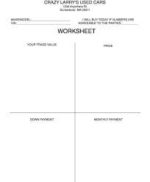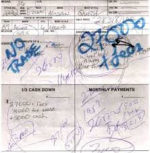I’ve loved cars for as long as I can remember. I fell in love the first time when my dad took me shopping for a secondhand car at about 7. It was a ’59 Porsche Convertible D, a black roadster with red vinyl seats and I had never seen anything like it. It had been well used by the young guy selling it. He wanted $600 which was more than my dad had budgeted. My dad bought a Chevrolet Corvair instead. It broke my heart that the little Porsche wasn’t coming home with us, but it started a love for cars. Much of my youth was spent imagining what it would be like to drive this dream car and others like it. Some people consider cars basic transportation but for me it is part living the life of my dreams.
My first career was in cars, and over the years I have bought at least 30 cars, so I know a lot of the ins and outs. I have also made all the mistakes I am going to highlight below. As your financial advocate I want you to win at getting a great deal on buying the car you would love to drive. They say the #1 fear is public speaking, but I think it might be car dealers. The process is actually incredibly simple – 4 pieces of paper and a credit check (if you are buying from a dealer). Some dealers make it look complicated because it puts you at a disadvantage. I’ve helped my clients navigate the process, and I want to share the top tricks I’ve learned to give you the advantage and avoid the common pitfalls.
The 3 things everyone needs to do first are:
1: Figure out what you want. This is the fun part for me, but I realize it may be a bit overwhelming for some. But don’t go to a car lot if you are not intending to buy something. Be sure what you want before you step foot onto a car lot. If you need some assistance deciding if what you want is realistic, I’m a phone call away.
2: Price it out on Kelley Blue Book at KBB.com, Car Gurus, or one of the other free online valuation services. Shockingly, Facebook Marketplace is not a bad place to shop and CarMax is a good resource as well. If you are trading a car in, use KBB.com to estimate the value. Be sure to use trade-in value. It’s important that you know the value of the car you are trading in as well as the car you are buying. Print both out and take them with you when you go shopping.
3: Get pre-approved by your bank. (If you are a cash buyer, see the private party purchasing directions at the end.) Whether you plan to buy from a dealership or private party, reach out for financing to your bank – hopefully a friendly neighborhood credit union. If it’s not, please read last month’s newsletter “Your Bank Is Just Not That into You – and Two Things You Need to Do About It.” A bank or credit union can get the money to a dealer or private seller within days.
If you’re shopping a dealer because you want a new car (or you want a used car with a warranty) you may feel the sense of dread as you enter the lot. What you may be sensing is that you are at a disadvantage. We’ll attempt to shift the scale in your direction here.
1: Know how to walk away and know when to run. Recently a client considering a new Maserati asked me, “What if after I drive it, I don’t want it?” I told him, “No problem. You come back and say. ‘I like it. I’m ready to buy, but I have a tax lien and a bankruptcy last year, that shouldn’t be a problem, right?’” He decided against the Maserati so he tried my suggestion, and the dealer just went right back to his cubicle. My client had a nice little research test drive, and got an ultra-cool Porsche SUV instead. Use this when you are not quite sure what you want but don’t want to feel obligated to help out the salesperson make his month.
2: Bring the most badass calculator you have along with your printouts of what the car you want and what your trade-in are worth. As soon as you’ve driven it and confirmed it’s in good condition and you sit down with the dealer, take your calculator out. It’s even better if it says “financial calculator.” You just leveled the playing field. Margins on some cars are pretty thin these days but there is a lot of profit in the financing. They won’t be as happy to see you with a pre-approved loan, but it gives you a bid for them to compete with, and some idea in advance how much interest you should expect to pay. They’re going to try to make the financing look complicated and it’s just not, especially if you’re buying. Run the numbers on the total cost of the financing they are offering in front of them. If you’re leasing, the financing can be a little trickier. If you want help with that, or advice about whether buying or leasing makes more sense in your situation, give me a call.

3: Know what you do need. Ultimately the process is as simple as 4 documents – the title, the bill of sale, the power of attorney to get your financing lien payoff notice, and the release of liability.
4: Know the pitfalls and tricks. There are all kinds of tricks dealers are known for that are red flags for you to flip the conversation or walk away.
“I have to go talk to my manager.” This line is scripted to generate a bit of anxiety and to keep you sitting there as long as possible. The salesperson’s goal is to wear down your resistance, so you’ll take their offer, and even feel relieved doing so. During negotiations, shady dealers have even been caught hiding the keys to a customer’s car while it’s being appraised, saying that the keys are lost. It’s just another way to add a little more pressure, a strategy. If they start playing the “I have to talk to my manager” game, just say right away, “Time out. Let’s walk back there together.” And if they say, “I’m so sorry, we seem to have misplaced your keys,” get out your phone and call the police.
The 4-box trick – the oldest dealer game designed to exhaust and confuse you in the car dealer world. If you see them take out a piece of paper and start drawing four boxes of numbers, tell them “You can just stop right there with the 4 boxes. I’m not playing that game.”


Check out https://www.consumerreports.org/consumerist/dealerships-rip-you-off-with-the-four-square-heres-how-to-beat-it/ if you don’t believe me.
Know what add-ons you do (and don’t) want. Car dealers make most of their money in F&I – finance and insurance – so gap insurance, extended warranties, pre-paid maintenance, mudflaps, undercoating, and paint protection are all things they will offer you. None of these are generally a good deal. You can get gap insurance (if you even need it) from your own insurance company, who you should already be communicating with anyway. It’s questionable whether extended warranties pay off and a pre-paid maintenance plan can lock you in with a dealership that has terrible service. I know this as it’s happened to me. By the way, “paint protection” is $6-worth of product. If you have questions about any of these, give me a call. And maybe watch the movie Fargo before you go.
Make sure you double-check the numbers on the paperwork at the end before you sign. This will shift things in your favor. Take the time to go through every number and make sure it is what you agreed to.
If you’re shopping private sellers, meaning you know exactly what you want, you can find it, and you have the cash, this is the best way to go. For safety, you should absolutely pay for a report from CarFax. This inexpensive online service will help you determine whether a car has been in an accident, or salvaged, if the mileage is true and correct, where it was registered – everything on record. You can also consider a pre-purchase inspection at a reputable shop. If your seller is legit, they won’t mind you having the car checked out. It will be at your expense, but it could save you a lot of headaches and money on a car with issues. These are both important choices and will indicate value as well as whether you may want to buy or pass. Many private sellers will even purchase the Carfax for you to make it easier for you to decide. One last thing: when buying or selling a car via private party, I like to do it at AAA or their bank. AAA will help you get the paperwork right, file the lien release and get the transfer process started.
This is just a list and there are lots more resources out there. If you need assistance, don’t hesitate to let me know. I have lots of reputable resources in the car biz and I am happy to talk through any decisions. Call me.
The beautiful image in our header is my mentioned dream car, the 1959 Porsche Convertible D, as featured on Classic Driver. There is an excellent history of the model here.






